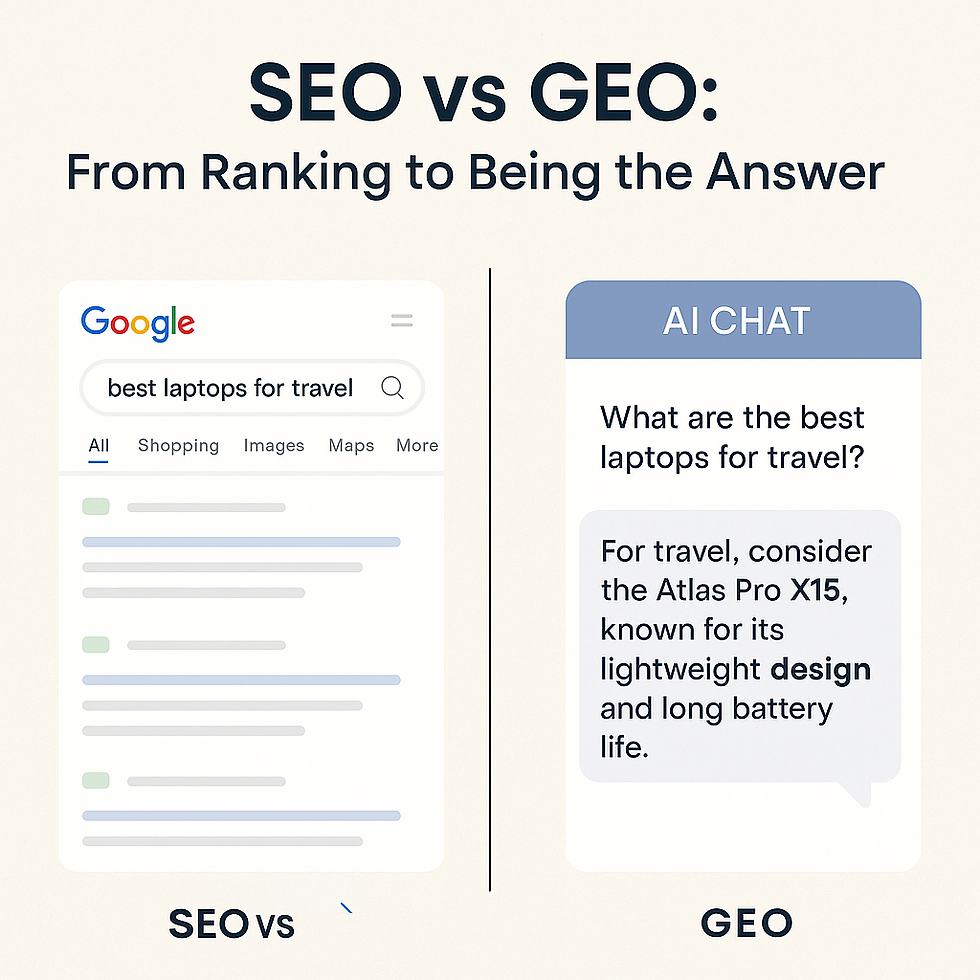Generative Engine Optimization (GEO): The Future of Search in 2025
- Thomas Walker
- Sep 24, 2025
- 3 min read
Search is changing faster than ever before. For years, brands have focused on SEO, Search Engine Optimization, to appear on Google’s results pages. But with the rise of AI-driven search tools like ChatGPT, Gemini, and Perplexity, the way users discover answers and recommendations has evolved.
Enter Generative Engine Optimization (GEO): the emerging discipline of optimising content so it’s surfaced by AI-generated answers. In 2025, GEO is no longer a “future trend” - it’s quickly becoming an essential part of how businesses ensure visibility in an AI-first search landscape.
At Atlas MKT, we’re already adapting client strategies to align with GEO, helping brands show up not just on Google, but also in the conversations people are having with AI engines.

What Is Generative Engine Optimization (GEO)?
Unlike traditional SEO, which optimises for search engine algorithms, GEO optimises for AI language models that generate responses to user queries.
Instead of presenting a list of links, AI tools provide direct, conversational answers — often referencing or summarising content from multiple sources. That means if your brand doesn’t appear in those generated answers, you’re invisible to a growing portion of your audience.
Atlas insight: if SEO was about ranking in Google’s top 10, GEO is about being part of the one answer that AI delivers.
Why GEO Matters in 2025
AI-powered search is growing fast. Statista (2025) estimates that over 30% of global internet users now use AI-driven tools for daily search. Younger audiences especially are shifting from traditional search engines to conversational platforms where answers feel faster and more personalised.
For businesses, this means the competition has moved from fighting for clicks on page one of Google to fighting for inclusion in AI-generated responses. GEO is how you future-proof your marketing strategy to stay discoverable.

How GEO Differs From SEO
While SEO and GEO overlap, their core strategies diverge:
SEO focuses on keywords, backlinks, and technical optimisation to rank in search engines.
GEO focuses on context, authority, and clarity so AI engines can understand, reference, and trust your content.
For example, AI models value concise, clear explanations over keyword stuffing. They look for credible, structured content that can be easily summarised. Businesses that adapt to this format are more likely to be included in AI-generated answers.
How to Optimise for GEO
Winning in GEO requires a new approach:
Answer questions directly: Structure your content around the questions people are asking. FAQs, how-to guides, and explainer blogs work particularly well.
Show credibility: Cite data, link to reputable sources, and include author expertise. AI tools prefer trustworthy, well-supported content.
Use structured content: Clear headings, subheadings, and schema markup help AI engines parse your content more effectively.
Diversify formats: AI pulls from blogs, case studies, videos, and even podcasts. The more formats you publish, the better your chance of being surfaced.
At Atlas MKT, we’re already aligning blogs and landing pages with GEO principles — helping clients like Fremantle Bikes and Villiers Jets adapt to an AI-first search world. You can see examples of this work in our Portfolio.

The Commercial Opportunity of GEO
Being included in AI-generated answers doesn’t just drive traffic, it builds trust. When ChatGPT or Gemini references your brand, it carries implied authority. That credibility leads to higher conversions, as customers are more likely to trust recommendations from AI tools they use daily.
According to PwC (2024), brands that optimise early for AI search could see up to 20% higher lead conversion rates compared to those relying solely on traditional SEO.
Final Thoughts: GEO Is the New SEO
In 2025, GEO isn’t replacing SEO - it’s building on it. Businesses that adapt now will enjoy a first-mover advantage, gaining visibility in spaces where competitors aren’t even looking yet. Those who ignore it risk being invisible in the conversations shaping consumer choices.
If you want to make sure your brand isn’t left behind, explore more insights on our Blog, review client results in our Portfolio, or Book a Call with Atlas MKT today. Let’s optimise not just for Google, but for the AI engines defining the future of search.






Comments